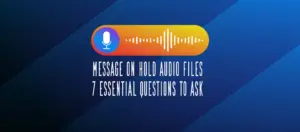The term VOIP (voice over internet protocol) is used liberally, and may refer to a simple dial tone, or a complete off-site system. The difference regarding music on hold is huge. Here are a few tips if you’re looking into hold music for your VOIP system.
We use the term “hosted PBX” to describe an off-site service whereby your phone system does not reside on your site. You have phones (extensions) but no central control box or brain in your phone room. Vendors in this category are: Virtual PBX, Ring Central, Access Direct, OnSIP, Grasshopper, TDS Metrocom and many more. The names for the “off-site” service vary, including “hosted IP” “virtual PBX”, “VOIP enabled”, “hosted VOIP” and on and on.
When you hear these terms, you’re hearing about a phone system that receives messages on hold via an “upload” through a web interface. Here’s why we’re wary of this type of phone system:
- Your messaging on hold service cannot load your messages for you unless given your phone system passwords
- You must take the time and effort to learn how to change your messages and upload them yourself
- Most hosted PBX systems do not allow changing of the messages on a schedule (if you don’t do it manually, it doesn’t get done)
- Most virtual PBX systems play the on-hold message from the beginning each time the call is placed on hold.
Imagine calling your business, being placed on hold and hearing the same 20 seconds of music and message you heard yesterday. Then the party answers but has to check on something for you and places you on hold once again. You hear the exact same 20 seconds of audio once again. If you have a 4-minute music on hold message created, the only folks who will hear minutes 2, 3 and 4 are those you leave on hold for that length of time (you and I both know hold times over 1 minute are dangerous to the business).
If you’re being wooed by an off-site PBX service, ask, “May I use my own music on hold equipment here at my business?” If they say, “no”, you’ll be forced to load messages yourself and may subject your callers to the same few seconds of hold music every time they call.
One work-around may be to have short voiced announcements on hold that you change weekly (if you have time).
Unless you have a vendor that understands that an ongoing, rotating or changing hold message announcements are necessary, you could be disappointed.



